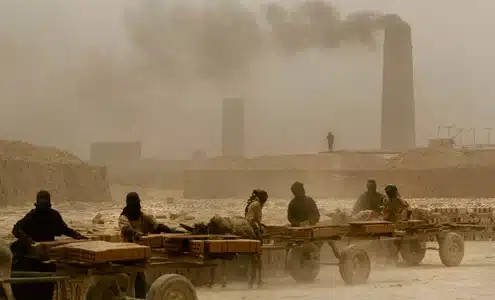Introduction
The contradiction in the geographical distribution of Iraq’s population precisely reflects the contradiction in the distribution of wealth in capitalist society. This divide has been deepened by ongoing migration from rural to urban areas. Modern migration is driven by rising temperatures, water scarcity, and outdated irrigation methods, which have devastated rural communities and forced thousands to relocate to large cities. Consequently, this has led to overcrowding, increased poverty and unemployment, and the expansion of slums on the outskirts of cities.
All of this social movement has led to an expanded division of labor, which has, in turn, intensified the antagonism between town and country. In urban areas, this has strengthened competition between workers and small capitalist enterprises. This development, which involves various contradictions, also leads to conflicts within families. At the same time, it results in a broader distribution of population, labor, the products of labor, and, consequently, property.
A 2023 World Bank report identified Iraq as one of the countries most affected by global warming. Summer temperatures now regularly exceed 50°C for extended periods, and water availability has plummeted over the past two decades–from over 2,000 m³ per capita per year to less than 500 m³ today. The Tigris and Euphrates Rivers, which once sustained the cradle of civilization in Mesopotamia, have been reduced to polluted and stagnant waterways.
This coincides with a population increase from 20 million in 1994 to nearly 45 million in 2024, fueling an ongoing migration trend. Some are relocating to Iraqi Kurdistan with their livestock, where water resources remain more reliable. Meanwhile, the continued rise in oil production and exports year after year has deepened economic inequality, enriching capitalists and corrupt politicians. Meanwhile, at the opposite end of society, the number of impoverished people without income, housing, or work continues to rise.
In addition to the turbulent economic situation and ongoing displacement, climate change has had dire consequences for Iraq’s poor, particularly in terms of health. This environmental strain not only reduces agricultural yields and shrinks arable land for the rural proletariat but also worsens their health. Consequently, the decline in agricultural production means poverty, unemployment, and health problems, while also threatening food security at a national level.
Water pollution has led to a rise in waterborne diseases and poor sanitation. In 2021, UNICEF reported that 3 out of 5 children in Iraq lacked access to safe drinking water. In 2018, over 118,000 people were hospitalized in Basra Province due to contaminated water. Increasing dust and sandstorms have caused respiratory infections, asthma, and other long-term health issues.
Meanwhile, extreme weather events such as floods and storms have displaced communities, caused injuries, and resulted in loss of life.
The Role of War in Iraq
In addition to climate change, Iraq’s economic imbalance and the deterioration of the social conditions of the poor have intensified the ongoing economic crisis. The Gulf War (1990— 1991), the Iran-Iraq War (1980—1988), the Halabja chemical attack (1988), and the U.S.-ledinvasion of Iraq (2003) have all left lasting scars. Saddam Hussein’s order to drain the southern marshes in retaliation for the 1991 uprising further damaged Iraq’s fragile ecosystem.
This paints a stark picture of the development of capitalism, highlighting its role in environmental pollution, rising temperatures, poverty, and unemployment, all of which have led to an economic and social crisis. Desertification continues, and the situation has shifted from migration to the complete abandonment of livelihoods by the impoverished rural proletariat.
Agricultural and Desertification
Despite this natural tragedy, exacerbated by the dysfunction and corruption of capitalist management, Iraq’s largest food industries—agriculture, livestock, and fishing—have been severely impacted by climate change. Studies have shown that desert areas in Iraq have increased by 5%, and by 2022, approximately 39% of the land was affected by desertification. Iraq’s water bodies and river basins are particularly vulnerable to global warming, rising salinity, and high evaporation rates.
Hunger in Iraq
As demonstrated, the combination of these social problems—rising temperatures, environmental degradation, increasing poverty and unemployment, and deteriorating living standards—cannot be separated from the broader structure of capitalist society. The direct consequence of this tragedy was the eruption of the most violent uprising in Iraq’s proletarian history in 2019, which exposed the widening gap between the two poles of capitalist society: wealth and poverty.
Poverty and hunger are among the most pressing issues in Iraq today. According to the World Food Program, 2.4 million people suffer from acute hunger, with 31% living below the poverty line.
Rising Temperatures and Future Prospects
Under the banner of addressing the crisis, the United Nations, in cooperation with the Iraqi government, the United States, and international donors, established the Funding Facility for Stabilization (FFS), allocating more than $1.4 billion to restore basic services and improve infrastructure. However, the natural and social conditions continue to deteriorate year after year. Climate change accelerates, temperatures rise, and water sources and rivers continue to dry up, exacerbating the social and economic challenges faced by Iraq’s urban and rural proletariat. The solution does not lie in the disbursement of billions by corrupt individuals, but in addressing the root causes of the economic disruption.
The issue at hand is not merely a local, national, or even Iraqi concern; it is a global challenge that can only be addressed on an international scale. A resolution will remain out of reach unless humanity adopts a new approach to production—the cooperative model, where producers are organized through self-management. This requires a fundamental shift in human cooperation, which can only arise through collective action. As the temperature rises irreversibly, economic crises deepen without resolution, and the environment continues to deteriorate, a viable solution can only be achieved by reimagining production within a new social framework—perhaps socialism¸ cooperative production.
References:
- 1. 2. 3. Projection of Agricultural Water Stress for Climate Change Scenarios: A Regional Case Study of Iraq https://www.mdpi.com/2077-0472/11/12/1288
Iraq: A Rapidly Changing Climate, and imperative for coordinated action, Norwegian Refugee Council https://www.nrc.no/perspectives/2023/iraq-a-rapidly-changing-climate-and-imperative-for-coordinated-action/
Sustainable Solutions to Combat Climate Change in Iraq https://reliefweb.int/report/iraq/sustainable-solutions-combat-climate-change-iraq - 4. World Food Program https://www.wfp.org/countries/iraq

